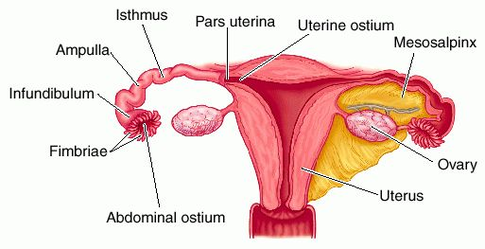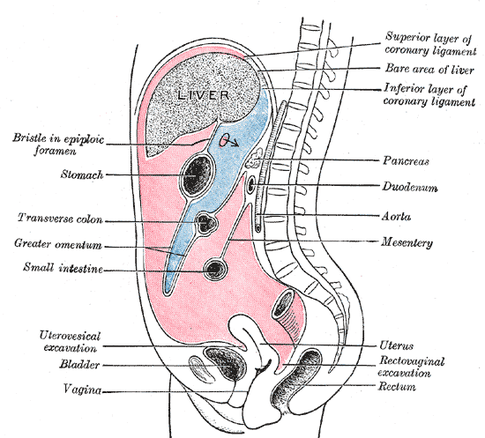Someone asked me this question on Quora a few days ago, and people kept answering with crazy stories about women who got pregnant, had C-Sections and completely empty uteruses were found during the procedure, only to discover that the baby was growing somewhere else. So I had to answer. Spoiler alert: No, you can?t get pregnant without a uterus, but you can grow a fetus somewhere else if you have one.
Ok, let me make this very clear. There?s a difference between ectopic pregnancy (A fertilized egg implants in other place that its not the endometrial layers of the uterus) and this question. The short answer is no, you can?t get pregnant without a uterus, and I?ll explain why down below. Now, if the question is: Can you carry a pregnancy outside of the uterus? then the answer is yes. And I?ll explain that now.
Ectopic pregnancies are unfrequent, but not uncommon. Why does this happens?
Well, lets look at how ovulation happens for a second (This example will be given considering a fertile woman, under no contraception of any kind and a healthy male, with a normal spermatic count)
As you can see, the fallopian tubes and the ovary aren?t in direct contact. The follicle that matures in the ovary is mostly liquid and in the inside, a mature egg is waiting to be released, When the pressure of the liquid increases, the follicle ruptures, and the pressure expels the mature egg forward. In the meantime, the fallopian tube ?stretches? thanks to a thin layer of muscles in its anatomy.

The fimbriae, the first portion of the fallopian tube, has this hand ? like aspect. What that does, is catch the mature egg that the ovary releases. Those hair ? like protuberances in the lumen (Inside) of the fallopian tube called cilia are responsible for the transportation of the egg (Secretions that are rich in nutrients and glucose are also produced. This helps with motility and survival). And so, the egg moves towards the uterine cavity. In the meantime, and if an ejaculation takes place, semen will be collected in the posterior vaginal fornix (Deepest point in the vagina) The cervix (Entrance of the uterus), will be covered by clear, watery mucus. Sperms will move as a whole, mucus will facilitate its entrance to the uterine cavity, and so, they will begin to ascend until they reach the interstitium (Portion of the fallopian tube that penetrates the uterine ostium or uterine cornua and reaches the uterine cavity).
Under ideal circumstances, the mature egg or oocyte and the sperm will meet in the middle of the fallopian tube (Isthmus). Conception will happen, the egg will move forward to the uterine cavity, implant in the endometrial walls and pregnancy will occur
Now, How ectopic pregnancy happens, then?:
The lifespan of sperm is 72 hours. That means that for 3 days, spermatozoids can survive inside the uterus. If the woman is near her fertile days, cervical mucus will be just as clear and watery, and the follicle of the ovary will be protuberant, although not ready to be released just yet. So the sperm will move forward, and forward, and forward, until it meets the egg somewhere. If there?s no egg to meet, a very small portion will fall after crossing the infundibulum of the fallopian tube. Some might get trapped in the fimbriae, and if the fallopian tube is closed enough, it might even fall on top or near the enraptured follicle in the ovary. Or maybe the egg was released normally, transportation starts, and fecundation occurs in the infundibulum, where gravity might play its part.
Hopefully, now you?re getting the picture.
lets say that ejaculation happens 60 or 70 hours before ovulation. The sperm will have more than enough time to move freely, and once the egg ruptures, it might be intercepted by spermatozoids although the position isn?t ideal. In most cases, this egg would be discarded, but the human body can?t be generalized.
Ectopic pregnancy is unfrequent, but not uncommon. The possible locations are:
- Fallopian tubes: 95% of all ectopic places will occur in the fallopian tube, usually because the cilia is damaged, or it moves abnormally, and so the egg will move very slowly or not move at all, and the process will proceed normally although abnormal circumstances are clear. But secretions can keep nutrients coming and as long as the embryo its small enough, it will survive for awhile. Eventually, it will die. Pregnancies in this portion are unviable, and need to be interrupted as soon as possible to prevent permanent damage to the fallopian tube or even rupture.
- Cornua of the Uterus or Uterine Ostium: 2,5% of ectopic pregnancies occur near the corner of the uterus. Survival rate up to this point is better, but not entirely so.
- Ovary, cervix of abdominal cavity: The remaining 2,5% will occur in either of these structures. Ectopic pregnancies in ovaries and cervix are unviable, and again, it needs to be terminated (The ovary has to be removed), but not in the abdominal cavity.
The egg might be fecundated, but fall, either from abnormal functioning of the cilia, or because fecundation took place in the first portions of the fallopian tube, and it will land in the abdominal cavity. This place, is covered by a membrane called peritoneum (In pink, or red, depending on your screen). The visceral peritoneum, covers the intestines and the lower portion of the stomach, and its rich in blood vessels. This is why implantation can happen. The fertilized egg will attach to it, and the soon to be placenta will rupture vessels and take advantage of them. The embryo, and afterwards fetus will be protected by something called the amniotic sack, inside that, there will be amniotic fluid.

This is extremely rare though. Eggs that fall to the abdominal cavity get absorbed, not implanted. But it can happen. The conditions are far away from ideal, the fetus will be underweight and weak, because the placenta needs a heavy blood flow that the peritoneum cannot provide adequately, the mother will experience severe damage to internal organs. (The placenta will implant and grow over organs like the bladder and the outer body of the uterus, and might create permanent damage). But with modern medicine, you can save one or both.
Now, why is pregnancy impossible without a uterus?
Lets say a woman has no uterus because of an hysterectomy. There are 3 types.
- Subtotal hysterectomy: Where the uterus is taken, but the cervix and fallopian tubes remain.
- Total hysterectomy: Where the uterus and cervix are taken
- Radical hysterectomy: Where the uterus, the cervix the upper third of the vagina is removed
The ovaries will remain under any of these 3 procedures, and the mature egg will fall directly to the abdominal cavity if there are no fallopian tubes, or will be captured by the fallopian tubes but either stay inside and dissolve, or fall to the abdominal cavity and dissolve.
And what if we have sex and ejaculation takes place:
Either of these 3 procedures, would leave a closed vagina, completely sealed, and so, there?s no place for sperms to enter, not even to fall into the abdominal cavity. But just for argument sake, lets say there?s a small opening. The cervix remains, and it wasn?t sealed properly. So, what happens then?.
The uterus contracts to facilitate the ascending of sperm to the fallopian tube. Without a uterus, this will not happen. And why is the fallopian tube so important if you can actually carry a pregnancy in the abdominal cavity?
Remember those nutritious secretions in the fallopian tubes? Those secretions give extra nutrition to the egg and the sperm to assure survival. It also changes the chemical balance of the membrane in every spermatozoid that reaches this point, they will become hyperactive, and will move harder and faster. Proteins in their membrane start to change, and when they reach the egg, their heads will open, and so chemicals will be released to break and penetrate the thick layers of the egg until one reaches the inner membrane. One will be able to go through. The rest will die.
With no fallopian tubes (Either absent or impossible to reach because there?s no uterus to assure this), the survival rate of the egg would be considerably diminished. The semen cannot move at such a rate to encounter the egg before its too late, and so, fecundation is impossible.
Every normal pregnancy is a small miracle. How humans haven?t gone extinct has become a bigger mystery as I pile more and more knowledge about women?s health. The fact that life can beat the regular odds is already mesmerizing to me, and then I remember that these things can happen and have happened, and I fall in love with my profession all over again. Midwifery can be a lot of things, but boring? Never.

